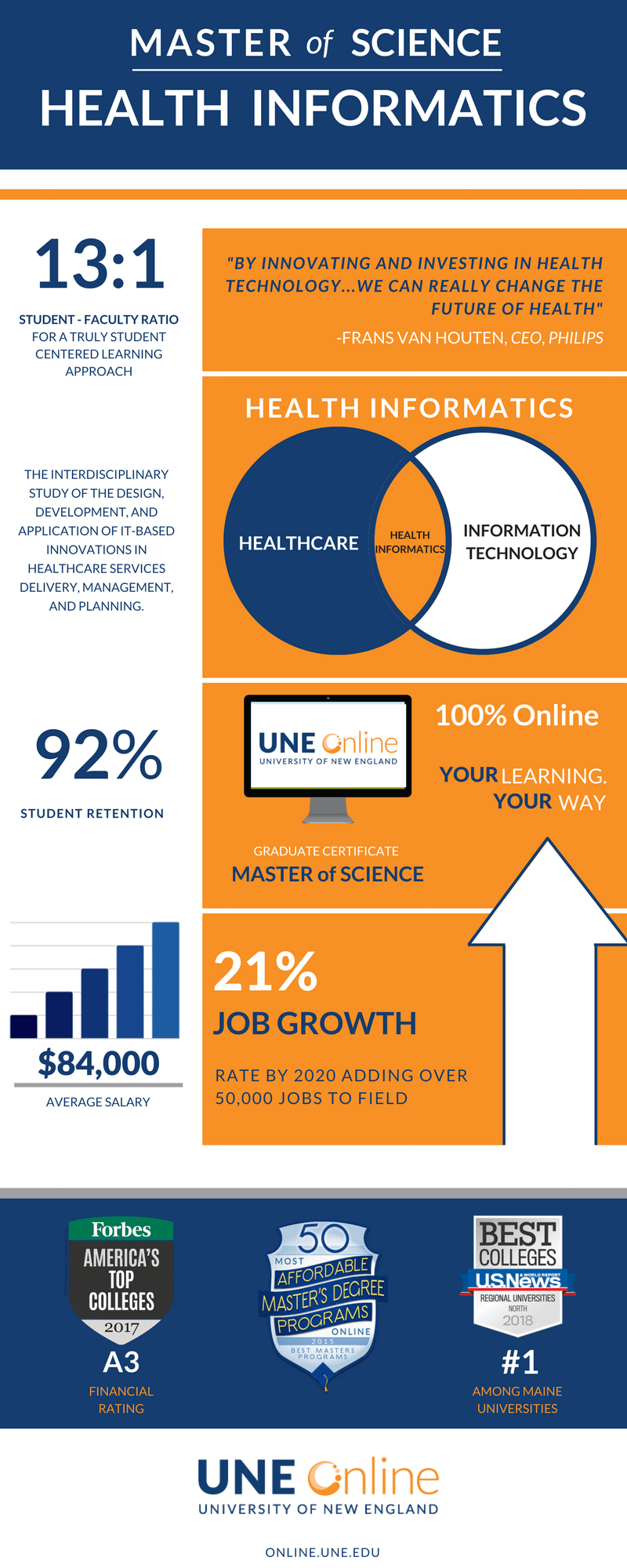What is Informatics in Healthcare?
Informatics in healthcare is the interdisciplinary study of the design, development, and application of technology-based innovations in healthcare services delivery, management, and planning.
The benefits of informatics in healthcare
As an industry, health informatics connects people with health technology to better improve healthcare outcomes and safety.
The field of health informatics covers health data collection, storage, reporting, and communication – and maintains a mission to advance operational efficiencies to streamline comprehensive care and protect patient data.
As developments to those processes are continually made through design, implementation, and configuration, the health informatics career field continues to expand.
How is informatics used in healthcare?
Informatics is used to achieve higher quality care. Informatics serves as a tool for patients to provide their clinician – or even a team of healthcare providers – with critical information.
Informatics can facilitate the sharing of information with family, friends, and other patients, allowing patients to take control of their own care by accessing electronic medical records or using a secure system where they can communicate with their doctors and nurses.
What are examples of health informatics in healthcare?
Health informatics – the intersection of people, technology, and data to improve the safety and quality of patient care – can be found in many forms.
A few examples include patient portals, electronic medical records (EMRs), telehealth, healthcare apps, and a variety of data reporting tools including health data analytics and predictive models.
What is the role of health informatics?
Health Informatics professionals capture, communicate and use data and clinical knowledge to support healthcare professionals. They make sure staff can use the latest technology so they can better deliver patient care – and they collate, store and retrieve records used in the diagnosis and treatment of patients.
Specialists in the Health Informatics field deal with the resources, devices, and methods required to optimize the acquisition, storage, retrieval, interpretation, and use of information in health and biomedicine.
Read more! Additional blog posts about Health Informatics at UNE Online can be found here: https://online.une.edu/blog/category/blog/online-learning/health-informatics/
What is the meaning of health informatics?
Health informatics is known by several different names. The field is also popularly referred to as healthcare informatics, medical informatics, nursing informatics, clinical informatics, biomedical informatics, health IT, and data science – among others.
Health informatics is a field that ties together multiple disciplines and uses technology and data to improve healthcare outcomes.
The disciplines involved include information science, computer science, social science, behavioral science, and managerial science.
How can informatics improve the quality of care for patients?
Informatics within healthcare creates a way for hospitals, clinics, provider’s offices, and other facilities to deliver patient-centered care. Health informatics plays a critical role in the push toward healthcare reform by leveraging the acquisition, storage, retrieval, and use of healthcare information.
This optimization of the lifecycle of data helps foster better collaboration among a patient’s various healthcare providers.
What are examples of nursing informatics?
Nursing informatics is a field that has evolved as the use and storage of data have been integrated into the forefront of patient care and practice management. As technology has evolved over the years, so have examples of informatics in nursing.
Examples of nursing informatics include the accuracy and communication of patient data and care, the management of patient portals, healthcare workflow management, computerized provider order entry (CPOE), and machine learning.
Read more examples of nursing informatics: https://online.une.edu/blog/examples-of-informatics-in-nursing/
How is informatics used in healthcare?
Health Informatics professionals work to improve healthcare delivery through the integration of data and patient care. Better patient outcomes are achieved through this intersection of health and technology.
Health Informatics students at UNE Online learn to apply new and innovative healthcare technology and data in a meaningful way to achieve better healthcare outcomes.
Is a health informatics certificate worth it?
Graduates with a Master’s in Health Informatics make on average $20,000 more per year than professionals with just a four-year degree – and Health Informatics is a stable field experiencing continuous growth.
As a society, we are relying more and more on information technology and data, which is creating new education and career paths in Health Informatics all the time.
Now is the very best time to blend your healthcare skills, IT skills, and leadership skills into a powerful new career.
Learn more with our free program guide
Tags: Graduate Certificate in Health Informatics | Graduate Programs in Health Informatics | Health Informatics | informatics | Master of Science in Health Informatics